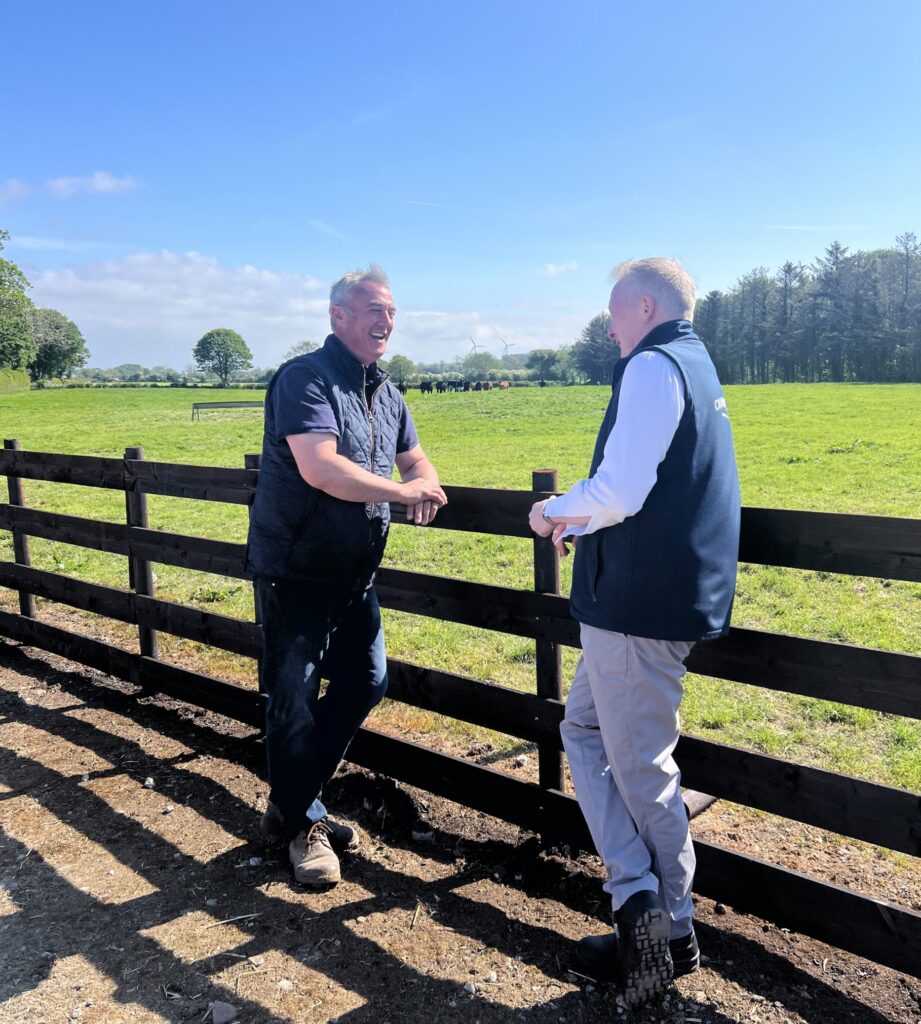Meet Anthony – one of our six trusted beef farmers

When we visited Anthony at his farm near Dearham, we were welcomed with a walk through the fields, a look at his well-kept cattle, and a good chat over a cuppa at the kitchen table with him and his wife.
Anthony is a sixth-generation farmer and a former auctioneer – and you can tell. He knows his livestock inside out and talks about farming with the kind of passion that only comes from living and breathing it. Every part of the farm has a story, and he’s proud of them all.
It’s always a privilege to visit the farms we work with and see the care and attention that goes into producing the high-quality beef our butchers are proud to prepare.
Here’s what Anthony had to say:
Q: How long have you been selling to Cranstons?
A: It’s been about six or seven years now. I’d wanted to supply Cranstons for a long time, so it was a real win when it finally happened. We put a lot of care into producing top-quality animals, and it means a lot to work with a local business like Cranstons, where the Master Butchers really do the product justice. They hang it properly, cut it with skill, and sell to customers who truly value good meat.
Q: Have you always been a full-time farmer?
A: I used to be an auctioneer – started out in Carlisle and then moved to Wigton. But when my first son was born, I decided to come back home and farm full-time. Never looked back.
Q: Can you tell us a bit about the farm?
A: It’s about 300 acres, and it’s been in the family for 130 years. I’m the sixth generation here. My dad was born in the front room of the farmhouse, and my grandad was born in what we call the playroom. I was the first one not born in the house.
Q: What sort of cattle do you keep?
A: We were traditionally dairy farmers until 1995, when we started farming beef cattle, and built up to the number we have today.
We farm a mixture of breeds; Limousin, Charolais and specialise in Hereford, Shorthorn and Aberdeen Angus. We try to focus on whatever breed produces the best tasting beef for our customers.
Q: What do you feed them?
A: We try to keep it as simple as possible. In West Cumbria, we can grow lots of high-quality grass and that’s what we mostly feed our cattle on. We keep them outside grazing for as long as we can.
When winter come, the cattle come inside and are bedded every day on straw. They eat a mixture of home-grown grass silage, then wheat maize and barley. We’re positive the cattle’s diet of mainly grass is what makes the eating quality of the beef so good and give it it’s rich traditional taste.
Q: The farm looked immaculate when we visited – is that important to you?
A: We try and keep it tidy and everything right. It’s how we’ve been brought up to have it. At the end of the day, it’s our home and our work place so it’s important it’s tidy.
Q: Who works on the farm with you?
A: There’s me and my dad (Len), who is still the boss and up first every morning. We have one man full time (Ashley) who is brilliant and came 25 years ago right out of school. My wife (Emma) sees to all the office work and my mother (Grace) is still involved. We are a good team.
Q: What does it mean to farm on land that’s been in your family so long?
A: It’s hard to explain the attachment farmers have to their land and home. They’re not just fields and a house, they’re generations of work and history.
Everything my parent did was for me, and I will try to do the same for the next generation.
Q: What’s your approach when it comes to choosing cattle to sell?
A: The main thing is to try and select the right animal for the right customer. Cranstons only want the very best, so we try our most to select them the top end quality beef we have.
It’s important to us to get the right cattle, and to raise them right. Since I worked as an auctioneer, I know what I am looking for. It is not about how expensive they are – it’s about quality.
It’s not just about rearing cattle – it’s about producing exceptional beef that people will enjoy eating. Every animal we send out represents the standard we hold ourselves to. I’m always thinking, is this good enough for Cranstons?
Q: What’s it like dealing with Cranstons?
A: We love dealing with Cranstons because there’s mutual respect. They want the best so we try to supply the best. Cranstons know what goes into producing these animals and appreciate what we do and that’s why we are such a good team.
Q: How many cattle do you send to Cranstons?
A: We supply Cranstons every week – sometimes 6, sometimes just 2 or 3 depending on demand and the time of year. But we’ve sent hundreds over the last 6 years/
Q: And finally – got a favourite Cranstons product?
A: The big pork pies for sure – we love them! And of course, the beef!
